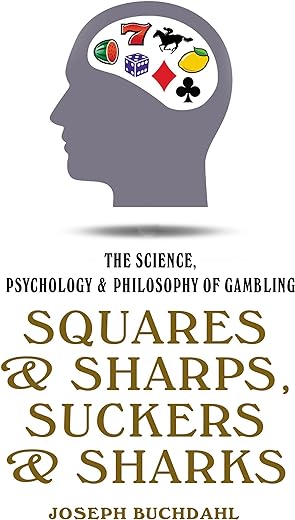Squares & Sharps, Suckers & Sharks: The Science, Psychology & Philosophy of Gambling: The Science, Psychology and Philosophy of Gambling
£23.60£25.60 (-8%)
People have been gambling, in one form or another, for as long as history itself. Why? Money, entertainment, escape and a desire to win are all traditional explanations.
Arguably, however, these are secondary considerations to a higher order purpose: a craving for control. Gambling offers a means of gaining authority over the unknown, granting us a sense of control over uncertainty. Almost always that sense is illusory – gambling, including betting and investing, is essentially random – yet for many it is nonetheless profoundly rewarding. This book attempts to explore the reasons why.
Along the way, it examines:
- The science of probability and uncertainty
- Why gambling is often condemned
- The difference between expectation and utility
- The irrationality of human beings
- Evolutionary perspectives on gambling
- Luck and skill
- Market efficiency and the wisdom of crowds
- Why winners take all
- Cheating
- Why the process matters more than the outcome
‘Joseph delivers on his promise to familiarise anybody with an interest in betting or investing with the workings of the betting mind through an abundance of practical examples’ – Pinnacle
‘Squares & Sharps, Suckers & Sharks is a thoughtful book and a refreshing read’ – Betfair Pro Trader
Read more
Additional information
| Publisher | 2nd edition (20 May 2021), High Stakes Publishing |
|---|---|
| Language | English |
| Paperback | 352 pages |
| ISBN-10 | 0857304844 |
| ISBN-13 | 978-0857304841 |
| Dimensions | 15.24 x 2.79 x 23.5 cm |










by Amazon Customer
This is a really excellent book on the topic of betting and gambling. It also touches on other areas of risk such as investing.
If you have any interest in games of probability or of luck, I’d strongly recommend this book.
The authors analysis of the various contributions of skill and luck in different scenarios is hugely enlightening.
by Andrew Student
This is a well researched, well written book that provides a hypothesis about why gambling is popular despite the reality that few regular gamblers will win more than they lose.
Having read Joe’s two earlier books, I feel that this work represents the end of his journey from a curious and optimistic sports bettor to fully-fledged sceptic. Joe doesn’t believe that anyone can really beat liquid betting markets because the market engine is the best predictive model available. He makes a compelling case for his stance with his analysis of very large numbers of ‘tips’ from various sources.
A question less well addressed is whether (and to what degree) sharps can exploit the short-term pricing inefficiencies that must exist (the closing market is more accurate than the opening market, so the market is not perfectly efficient).
The book draws inspiration from a number of best sellers in the realm of behavioural psychology and randomness and I must say that his writing style stands comparison with them (his earlier works were somewhat clunky – so it’s not just his ideas that have developed over time).
Ironically, for a book that almost says betting can’t pay (it would be counter Joe’s financial interest to be too strident), he outlines two football betting approaches that most definitely would pay (until your accounts get closed, anyway).
If you have a serious interest in betting (especially sports betting), buy this book.
by Niall O’Connor
I enjoyed reading this book, which is essentially an amalgam of the most recent thinking in behavioural economics, neuroscience and psychology as related to gambling. Having said that, one was rather left with the impression that Buchdahl was the equivalent of somebody who was very good at writing a sex manual, but not very good at having sex.
The conclusion of the book, is nothing new; most punters do not win. The exploration of this theme is rather binary; people bet (in the context of the book, usually with fixed odds bookmakers), they fail to outsmart the purity of the betting market, and they loose.
Much is made of the Pinnacle model of betting; but this was of course before the company decided that it would not be renewing its UK licence (presumably because the model does in fact not work in the face of sharp bettors). There is simply not enough on the Betfair betting exchange; on why Buchdahl does not use Betfair and on the useage of Betfair by syndicates.
There is also not enough on the fact that betting has long moved beyond a simple transaction between punter and fixed odds bookmakers. No real mention of arbitrage; no mention of the distorting impact that spoofing on the betting exchanges is having on the betting market; no mention of the impact the exchanges are having on punter psychology (the ability to lay).
As with any book of this sort, it now seems a little dated as regard its conclusions on the neuroscience of gambling, and, it has also missed out on some of the new key developments in behavioural economics post Amos Tversky and Daniel Kahneman.
One is left with the conclusion that Buchdahl may have (unconsciosly) written the book in order to explain to himself why it is that he does not win at betting (and, for a man who does not, it is funny that he should spend so much of his time compiling a football stats website).
In Nuce, the book tells you that if you bet, you will probably not win in the long term. Whether you buy it, will depend upon the degree and extent to which you want to be told that.
by Marco Trucco
A fav quote of anti-gambling campaigners is “gambling is a tax on ignorance”. Politicians, priests and journos love that quote too. None of them ever read this book.
I never thought I could find a work quoting Reuven Brenner, Daniel Kahneman and Michael Shermer in the same paragraph. Thought I had to write it myself sooner or later. Imagine my surprise in finding this. Joseph Buchdahl did it, and much better than I could have ever done.
You can read this as a non-gambler, and by the end of it, you’ll be more informed than 99% of policymakers who preach about the evil of gambling fishing for votes.
You can read this as a gambler, and by the end of it, you’ll be sharper than 99% of gamblers who claim to be winners. It won’t turn you into a winner (you will realise how hard this is) but for sure it will help you to be a much smaller loser and a happier player.
A standing applause from a gambling industry veteran.
by M. Canning
Excellent, informative and enjoyable read. Extremely well researched. I used to think I was good at gambling, then eventually discovered I’m not – this book explains how and why I’m a monkey throwing darts. If I was a monkey I’d be smart enough not to care about the outcome, but because I’m human, I do; the monkey wins every time.
by NicklebyNick
This is a very well-researched book which squares the circle of academic merit and popular appeal. I am no stranger to the field of gambling research, and am pleased to say that this book is a standout contribution in its consideration of the science, psychology and philosophy of gambling. Fascinating and fun for the casual reader, but well referenced for those wishing to delve further. I differ markedly on the theological slant, but that is a minor distraction for me from the bigger picture. That is of an excellent contribution to the canon of books that should grace the bookshelf (actual or virtual) of anyone interested in popular science, behavioural psychology, probability, or gambling. Highly recommended.